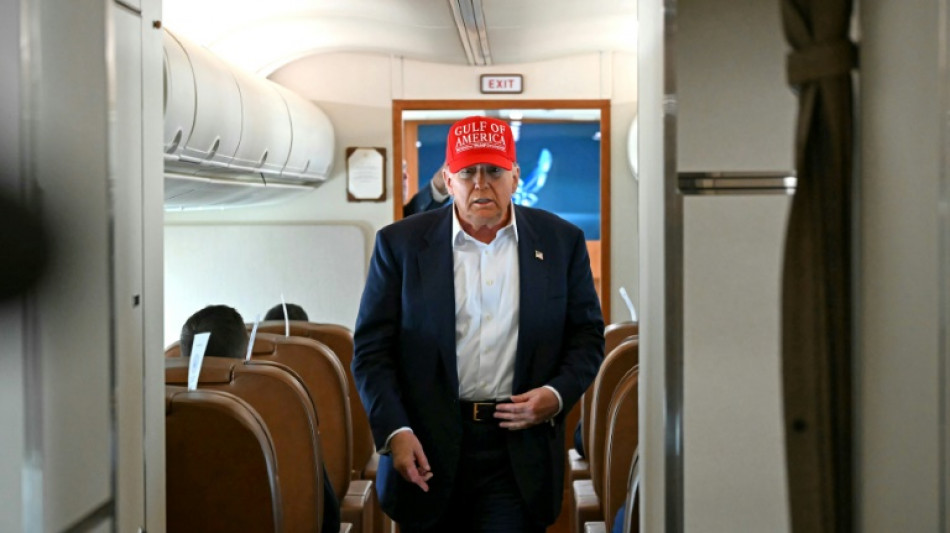
-
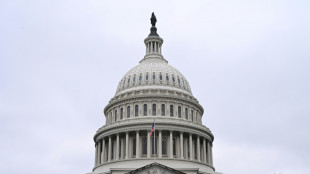 Stocks diverge as tariffs deadline looms
Stocks diverge as tariffs deadline looms
-
EU unveils long-delayed 2040 climate target -- with wiggle room
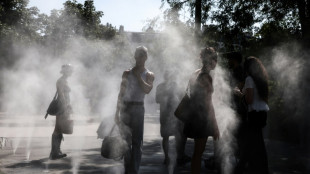
-
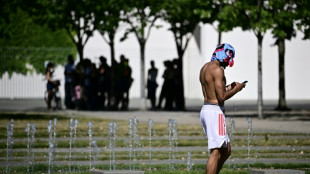 Central Europe swelters as heatwave moves east
Central Europe swelters as heatwave moves east
-
Hong Kong to regain IPO crown this year, say PwC and Deloitte
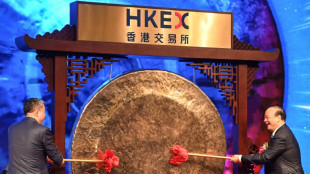
-
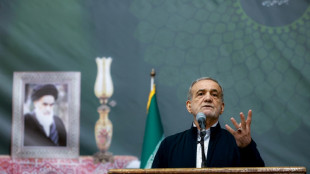 Iran suspends cooperation with UN nuclear watchdog
Iran suspends cooperation with UN nuclear watchdog
-
Israel's top diplomat urges seizing chance after Trump ceasefire push

-
 Australia cancels Kanye West visa over 'Heil Hitler' song
Australia cancels Kanye West visa over 'Heil Hitler' song
-
Israel FM calls to seize opportunity as Trump pushes for Gaza ceasefire

-
 Fire that closed Heathrow traced to unrepaired transformer
Fire that closed Heathrow traced to unrepaired transformer
-
Gaza rescuers say Israeli strikes kill 14 as Trump teases ceasefire push

-
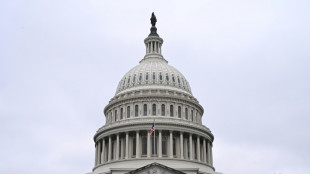 Asian markets mixed as trade deal cut-off looms
Asian markets mixed as trade deal cut-off looms
-
Dalai Lama says he will have successor after his death
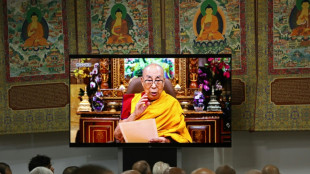
-
 Demining Ukraine: from drones to risking it with a rake
Demining Ukraine: from drones to risking it with a rake
-
Eggs en Provence: France's unique dinosaur egg trove
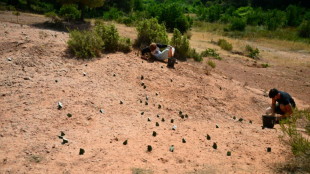
-
 'I lost my battle': warming sea killing Albania fishing
'I lost my battle': warming sea killing Albania fishing
-
Combs Trial: Day three of jury debate after partial verdict reached
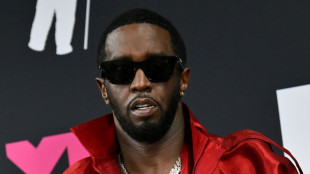
-
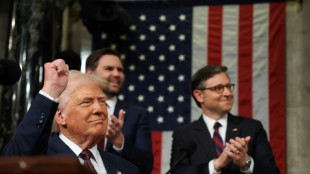 Giant Trump tax bill faces make-or-break vote in Congress
Giant Trump tax bill faces make-or-break vote in Congress
-
Oasis: five favourite hits

-
 'Finally': Oasis fans, young and old, gear up for reunion
'Finally': Oasis fans, young and old, gear up for reunion
-
North Korea opens massive beach resort: state media
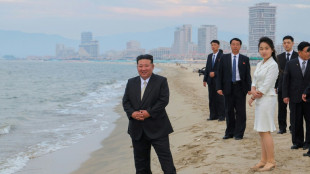
-
 'No roof' to Savea ability for ex-All Black Kaino before France Tests
'No roof' to Savea ability for ex-All Black Kaino before France Tests
-
Alcaraz faces amateur hour against young Brit at Wimbledon

-
 'Writing is thinking': do students who use ChatGPT learn less?
'Writing is thinking': do students who use ChatGPT learn less?
-
Australian airline Qantas says hit by 'significant' cyberattack
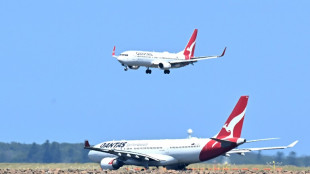
-
 India exporters cautiously optimistic as US tariff deadline looms
India exporters cautiously optimistic as US tariff deadline looms
-
Real Madrid oust Juventus as Dortmund reach Club World Cup quarters

-
 Relief coming for Europe after brutal heatwave
Relief coming for Europe after brutal heatwave
-
Fate of major trade deal with EU hangs over Mercosur summit

-
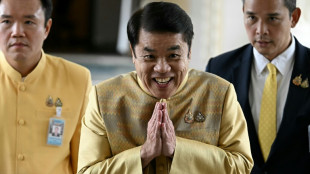 Thai veteran politician set for single day as acting PM
Thai veteran politician set for single day as acting PM
-
Guirassy double as Dortmund down Monterrey to reach Club World Cup quarters

-
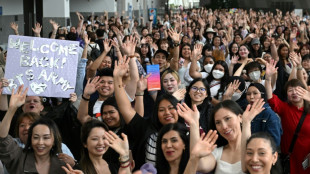 BTS agency confirms superstars' 2026 album, tour
BTS agency confirms superstars' 2026 album, tour
-
US halting some shipments of military aid to Ukraine
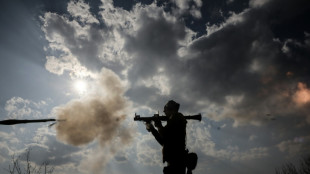
-
 ALMA lets astronomers see building blocks of early galaxies
ALMA lets astronomers see building blocks of early galaxies
-
Philippines biodiversity hotspot pushes back on mining

-
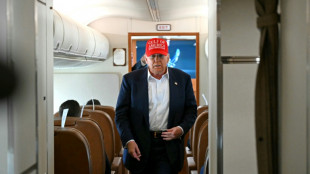 Deal or no deal: What happens with Trump's July tariff deadline?
Deal or no deal: What happens with Trump's July tariff deadline?
-
Canada turns to drones for reforestation after wildfires

-
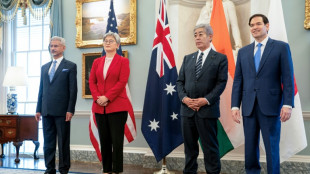 US, Japan, India, Australia pledge mineral cooperation on China jitters
US, Japan, India, Australia pledge mineral cooperation on China jitters
-
Son of kingpin 'El Chapo' to plead guilty to drug trafficking in US

-
 Atelier Home Sets a New Standard for Luxury Home Decor
Atelier Home Sets a New Standard for Luxury Home Decor
-
Nextech3D.ai Secures Annual Contract For AI-Driven 3D Cloud Model Hosting

-
 Global Sports Brand U.S. Polo Assn. Launches in Brazil With Grupo Pasquini
Global Sports Brand U.S. Polo Assn. Launches in Brazil With Grupo Pasquini
-
Faraday Copper Receives Bureau of Land Management Approval for Exploration Plan of Operations at its Copper Creek Project

-
 Bausch Health to Announce Second Quarter 2025 Results on July 30
Bausch Health to Announce Second Quarter 2025 Results on July 30
-
Atlantic Power & Infrastructure (AP&I) publishes their June 2025 edition: "AP&I Corporate News and Events."

-
 Prospect Ridge Options Castle Copper-Gold Porphyry Project In Toodoggone Mining District Of British Columbia
Prospect Ridge Options Castle Copper-Gold Porphyry Project In Toodoggone Mining District Of British Columbia
-
IRS 2290 Filing Season for 2025 Has Officially Started! Quick, Secure E-Filing with EZ2290
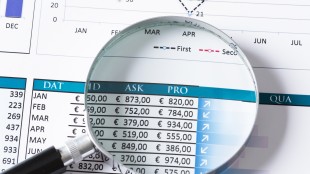
-
 Snowline Gold Discovers New RIRGS Target Near Its Valley Deposit and Provides 2025 Field Program Update
Snowline Gold Discovers New RIRGS Target Near Its Valley Deposit and Provides 2025 Field Program Update
-
Ares Management Corporation Schedules Earnings Release and Conference Call for the Second Quarter Ending June 30, 2025

-
 Critical Elements Announces the Signing of an Agreement to Buyback 49% Interest in the Bourier Property
Critical Elements Announces the Signing of an Agreement to Buyback 49% Interest in the Bourier Property
-
Strawberry Fields REIT Completes Acquisition of Nine Healthcare Facilities Located in Missouri


Deal or no deal: What happens with Trump's July tariff deadline?
A week before US President Donald Trump reimposes steep tariffs on dozens of economies, including the EU and Japan, many are still scrambling to reach a deal that would protect them from the worst.
The tariffs taking effect July 9 are part of a package Trump imposed in April citing a lack of "reciprocity" in trading ties.
He slapped a 10 percent levy on most partners, with higher customized rates to kick in later in countries the United States has major trade deficits with.
But these were halted until July to allow room for negotiations.
Analysts expect countries will encounter one of three outcomes: They could reach a framework for an agreement; receive an extended pause on higher tariffs; or see levies surge.
- 'Framework' deals -
"There will be a group of deals that we will land before July 9," said Treasury Secretary Scott Bessent last Friday on CNBC.
Policymakers have not named countries in this group, although Bessent maintains that Washington has been focused on striking deals with about 18 key partners.
"Vietnam, India and Taiwan remain promising candidates for a deal," Asia Society Policy Institute (ASPI) vice president Wendy Cutler told AFP.
Without a deal, Vietnam's "reciprocal tariff" rises from the baseline of 10 percent to 46 percent, India's to 26 percent and Taiwan's to 32 percent.
Josh Lipsky, international economics chair at the Atlantic Council, cited Indian negotiators' extension of their US trip recently in noting that it "seems like a frontrunner."
"Japan was in that category, but things have set back a little," Lipsky said, referring to Trump's criticism Monday over what the president called Japan's reluctance to accept US rice exports.
The deals, however, will unlikely be full-fledged trade pacts, analysts said, citing complexities in negotiating such agreements.
Since April, Washington has only announced a pact with Britain and a deal to temporarily lower tit-for-tat duties with China.
- Extended pause -
Bessent has also said that countries "negotiating in good faith" can have their tariffs remain at the 10 percent baseline.
But extensions of the pause on higher rates would depend on Trump, he added.
"With a new government, (South) Korea looks well positioned to secure an extension," Cutler of ASPI said.
Lipsky expects many countries to fall into this bucket, receiving an extended halt on higher tariffs that could last until Labor Day, which falls on September 1.
Bessent earlier said that Washington could wrap up its agenda for trade deals by Labor Day, a signal that more agreements could be concluded but with talks likely to extend past July.
- Tariff reimposition -
For countries that the United States finds "recalcitrant," however, tariffs could spring back to the higher levels Trump previously announced, Bessent has warned.
These range from 11 percent to 50 percent.
Cutler warned that "Japan's refusal to open its rice market, coupled with the US resistance to lowering automotive tariffs, may lead to the reimposition of Japan's 24 percent reciprocal tariff."
Trump himself said Tuesday that a trade deal was unlikely with Japan and the country could pay a tariff of "30 percent, 35 percent, or whatever the number is that we determine."
Lipsky believes the European Union is at risk of having tariffs snap back to steeper levels too -- to the 20 percent unveiled in April or the 50 percent Trump more recently threatened.
An area of tension could be Europe's approach to digital regulation.
Trump recently said he would terminate trade talks with Canada -- which is not impacted by the July 9 deadline -- in retaliation for the country's digital services tax, which Ottawa eventually said it would rescind.
This week, EU trade chief Maros Sefcovic is in Washington in a push to seal a trade deal, with the EU commission having received early drafts of proposals that officials are working on.
L.Durand--AMWN